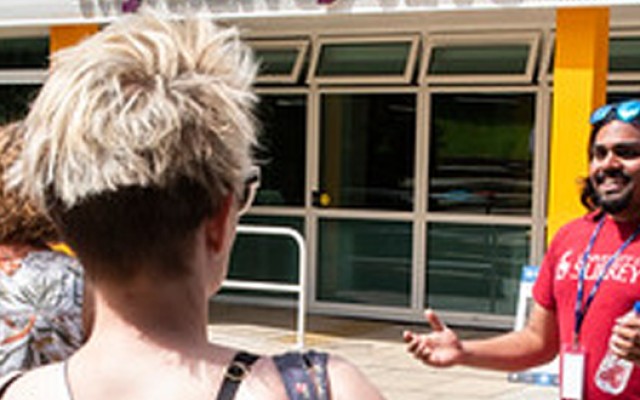


News and events
Stay up to date with our latest news and events.
Latest news

Upcoming events
Past events
Abstract
In business-to-business (B2B) markets, salespeople are pivotal in their firm's effort to provide solutions that address customer needs. However, current research on solution provision has primarily focused on the benefits firms derive from salesperson solution selling activities without focusing on customer benefits. This study addresses this gap, and presents an empirical framework based on role theory, and examines how salesperson solution involvement impacts microenterprise financial wellbeing through advice adherence. The study utilises triadic matched data in which microenterprises are nested within salespeople, who are in turn nested within branch managers. The findings show that salesperson solution involvement improves microenterprise financial wellbeing through mediating role of microenterprise advice adherence. The results also show that microenterprise financial literacy enhances the effect of salesperson solution involvement on advice adherence. However, social ties with microenterprise's network of peers and fear of failure negatively moderate the relationship between salesperson solution involvement and advice adherence.
Speaker bio
Professor Vida Siahtiri is the Associate Dean, Accreditation, Ranking, and Employability and Professor of Service Management at the La Trobe Business School. Vida has served in different roles and leadership positions at academic institutions across Australia. She has a wealth of experience in designing world class curriculum and is Highly Commended Educational Leader and teaching excellence award winner. She also has extensive leadership experience in international business. Vida’s research focuses on frontline service interactions, service innovation, service supply chain, professional service research, and Bottom of Pyramid.
Date
This seminar took place on 31 May 2023.
Abstract
Coopetition refers to cooperation among competitors. While these business-to-business marketing strategies have been found to boost company performance, the nature of this relationship remains under-researched. Accordingly, under the wider aspects of the resource-based view, this investigation examines the non-linear (inverted U-shaped) link between coopetition and company performance under the moderating role of competitive intensity. Using mixed-methods evidence from the New Zealand wine industry, the results indicated that coopetition has a quadratic relationship with company performance - which is negatively impacted by competitive intensity. Collectively, new evidence is offered on the potential dark-sides of coopetition activities via circumstances where collaborating with competitors is dangerous for organisations.
Please note that this presentation was based on the following paper: Crick, J.M., and Crick, D. (2021). The yin and yang nature of coopetition activities: Non-linear effects and the moderating role of competitive intensity for internationalised firms. International Marketing Review, 38(4), pp. 690-716.
Speaker bio
Dr James M. Crick is an Associate Professor of Marketing and Entrepreneurship at the University of Leicester, United Kingdom and an Adjunct Professor of Entrepreneurial Marketing at the University of Ottawa, Canada. His research examines topics, such as coopetition strategies, internationalisation activities, dynamic and evolving business models, and the interplay between a market orientation and an entrepreneurial orientation. His work has been published in outlets, including Industrial Marketing Management, the Journal of Business Research, the Journal of International Marketing, the Journal of Strategic Marketing, the International Marketing Review, the Journal of Rural Studies, the Journal of Business & Industrial Marketing, the International Journal of Entrepreneurship and Small Business, and the International Journal of Entrepreneurial Behavior & Research. Additionally, he serves as an Associate Editor of the Journal of Strategic Marketing, alongside undertaking other editorial board duties.
Date
This seminar took place on 3 May 2023.
Abstract
Confronted with heightened competition, organizations deploy disruptive practices to ensure survival and growth. In this context, strategists can harness the power of internal and deliberate unpredictability to outmaneuver rivals, rather than contend with environmental and uncontrollable unpredictability. Anchored in decision theory and using matched self-reported survey data with time-lagged archival proxy data, we find that hybridization of decision-making (the interaction of planning and spontaneity) is necessary for competitive unpredictability to develop within organizations. Interestingly, we also observe a curvilinear (invert-U) relationship between spontaneity and competitive unpredictability, which may be explained in two ways. First, spontaneity is likely linked to use of heuristics, which, while a route to speedy action, may also involve a degree of bias. Secondly, excessive spontaneity may be indicative of chaotic operations and the loss of adherence to the goals embedded in strategic plans. Importantly, we find that competitive unpredictability is positively associated with increases in performance, and that this effect is strengthened when new product development capability is high, suggesting that a focus of unpredictability on new products is key. Future research of interest (to me!) includes linking normative and descriptive models of decision-making to symptoms of anxiety. A reasonable body of work exists on how anxiety pathology affects everyday decision-making, though very little examines how highly functioning executives with anxiety traits (a not inconsiderable population) can mitigate symptoms through alternative modes of decision-making.
Speaker bio
Professor Anne Souchon is Chair of International Marketing at Loughborough Business School, Loughborough University, and a trained Mental Health First Aider. Anne’s research focus is on maximising organisational performance through agile and hybridised decision-making. She founded the Global Improvisation Dynamics Consortium in 2013, a cross-university research centre which now includes members from around the world (e.g., Canada, China, France, Ghana, the UK). The Consortium uses mixed methods to study how company performance increases when complementary decision-making processes interact. This work has featured in the Journal of International Marketing, Journal of Business Research, Industrial Marketing Management, International Marketing Review, among others. Anne’s publications have won numerous best paper awards, and she has been the recipient of several British Academy research grants. She also works closely with the private sector, notably with British Telecom on the use of the Net Promoter Score.
Date
This seminar took place on 8 March 2023.
Abstract
Reducing the risk of stockouts is an important issue in retail management. Stockouts are services failures that occur when products are temporarily unavailable. Yet, two studies showed when stockouts have multiple risk components, about one third of managers preferred to eliminate one risk instead of achieving a larger overall—but only partial—reduction of two risks. This zero-risk bias was neither associated with individual differences in risk aversion, intuition, nor deliberation. However, nudging managers with social information about relevant competitor behavior reduced the bias. These results contribute to the service failure literature—in particular research on stockouts—by investigating the behavioral component of managerial choice.
Speaker
Mario Kienzler is a Senior Lecturer at the Department of Management and Engineering, Linköping University (Sweden). His research interests include—among others—judgment and decision-making and the psychology of pricing. Mario’s research has been published in the Journal of Business Research, Industrial Marketing Management, Journal of Product & Brand Management, and Journal of Business & Industrial Marketing.
Date
This seminar took place on 16 February 2022.
Abstract
Influencer marketing is a popular strategy to connect with consumers. However, its effectiveness depends on the levels of engagement that influencers prompt on social media. Some posts resonate; others do not. Could subtle differences in language be a cause of such variation? This work investigates how language arousal in micro versus macro influencers’ sponsored posts might shape engagement for different types of campaign intent (from awareness to trial). Four studies, combining a text analysis of thousands of influencers’ social media posts and controlled experiments, demonstrate that more aroused language increases engagement with micro-influencers, but it decreases engagement with macro influencers, seemingly because it makes micro (macro) influencers appear more (less) trustworthy. These findings deepen understanding of how language arousal and influencer type shape consumer responses, reveal a psychological mechanism through which language arousal affects perceptions, and provide actionable insights for composing more effective social media content along the consumer funnel.
Speaker bio
Dr. Francisco Villarroel Ordenes (PhD. in Marketing, Maastricht University) is an Assistant Professor and Director of the MSc. in Marketing at LUISS Guido Carli University, where he teaches Business & Marketing Analytics, Performance Marketing, and Unstructured Data Analysis. His research revolves around the themes of marketing analytics, social media marketing, and customer experience, and it has been published in leading journals including the Journal of Consumer Research, Journal of Marketing, Journal of Service Research, Journal of Retailing, among others. He currently serves on the editorial review boards of the Journal of Consumer Research, Journal of Retailing, and the Journal of Service Research.
Date
This seminar took place on 7 December 2022.
Abstract
Influencer marketing is a popular strategy to connect with consumers. However, its effectiveness depends on the levels of engagement that influencers prompt on social media. Some posts resonate; others do not. Could subtle differences in language be a cause of such variation? This work investigates how language arousal in micro versus macro influencers’ sponsored posts might shape engagement for different types of campaign intent (from awareness to trial). Four studies, combining a text analysis of thousands of influencers’ social media posts and controlled experiments, demonstrate that more aroused language increases engagement with micro-influencers, but it decreases engagement with macro influencers, seemingly because it makes micro (macro) influencers appear more (less) trustworthy. These findings deepen understanding of how language arousal and influencer type shape consumer responses, reveal a psychological mechanism through which language arousal affects perceptions, and provide actionable insights for composing more effective social media content along the consumer funnel.
Speaker bio
Dr. Francisco Villarroel Ordenes (PhD. in Marketing, Maastricht University) is an Assistant Professor and Director of the MSc. in Marketing at LUISS Guido Carli University, where he teaches Business & Marketing Analytics, Performance Marketing, and Unstructured Data Analysis. His research revolves around the themes of marketing analytics, social media marketing, and customer experience, and it has been published in leading journals including the Journal of Consumer Research, Journal of Marketing, Journal of Service Research, Journal of Retailing, among others. He currently serves on the editorial review boards of the Journal of Consumer Research, Journal of Retailing, and the Journal of Service Research.
Date
This seminar took place on 7 December 2022.
Abstract
Discrimination remains a key challenge for social equity. Although most people agree that discrimination is unfair and should be punished, a prerequisite for acting upon these beliefs is that discrimination is detected. Yet, some types of discrimination may be less conspicuous because they do not fit people’s mental prototypes. Across seven studies (N = 3,486, five preregistered), we find that people show a blind spot for attractiveness discrimination. Despite similarly negative reactions to different biases when biases were made explicit, participants were less likely to characterize biased hiring outcomes as discriminatory when the bias was attractiveness (vs. gender and race). Our findings suggest people’s ability to detect discrimination is bounded, and that attractiveness discrimination may compete for attention against more prototypical types of discrimination. Consistent with this account, two interventions that made people more likely to detect attractiveness discrimination also made them less likely to detect gender and race discrimination.
Speaker bio
Johannes Boegershausen is an Assistant Professor of Marketing at the Rotterdam School of Management (RSM) at Erasmus University. He obtained his Ph.D. in Marketing from the University of British Columbia. Prior to joining Erasmus, he worked as an Assistant Professor of Marketing at the University of Amsterdam. Johannes' research examines marketplace morality, polarized sentiments, and well-being, often from a social-cognitive perspective. He is also involved in several metascientific projects designed to improve research practices (e.g., web scraping, digital quasi-experimentation). Johannes' work has been published in journals such as the Journal of Marketing, Journal of Consumer Psychology, and Journal of Service Research. He has received several awards (e.g., the 2018 C.W. Park Young Contributor Award from the Society for Consumer Psychology) and grants from organizations such as the Marketing Science Institute and Accessibility Standards Canada.
Date
This seminar took place on 30 November 2022.
Abstract
Marketing and management scholars increasingly use web scraping and application programming interfaces (APIs) to collect data from the internet. Yet, despite the widespread use of such web data, the idiosyncratic and sometimes insidious challenges in its collection have received limited attention. How can researchers ensure that the data sets generated via web scraping and APIs are valid? While existing resources emphasize technical details of extracting web data, this workshop summarizes a novel methodological framework focused on enhancing its validity. In particular, the workshop highlights how addressing validity concerns requires the joint consideration of idiosyncratic technical and legal/ethical questions along the three stages of collecting web data: selecting data sources, designing the data collection, and extracting the data. I will also provide food for thought for identifying promising web data sources and exploring novel approaches for using web data to capture and describe evolving marketplace and corporate realities.
Speaker bio
Johannes Boegershausen is an Assistant Professor of Marketing at the Rotterdam School of Management (RSM) at Erasmus University. He obtained his Ph.D. in Marketing from the University of British Columbia. Prior to joining Erasmus, he worked as an Assistant Professor of Marketing at the University of Amsterdam. Johannes' research examines marketplace morality, polarized sentiments, and well-being, often from a social-cognitive perspective. He is also involved in several metascientific projects designed to improve research practices (e.g., web scraping, digital quasi-experimentation). Johannes' work has been published in journals such as the Journal of Marketing, Journal of Consumer Psychology, and Journal of Service Research. He has received several awards (e.g., the 2018 C.W. Park Young Contributor Award from the Society for Consumer Psychology) and grants from organizations such as the Marketing Science Institute and Accessibility Standards Canada.
Date
This seminar took place on 30 November 2022.
Abstract
Consumers can become disengaged from advertisements, but there is little research on the subject. There is no clear, comprehensive definition of advertising disengagement or a scale to measure it in existing research. As a result, this research centered on developing the construct of advertising disengagement and preparing a measurement scale. There are six steps in the scale development process, with a total sample size of 1,252. The studies performed in the USA and UK outline an 18-item unidimensional scale for advertising disengagement. The scale assesses individuals' passivity and detachment from advertisements. The insights from this work indicate that consumer skepticism about advertisements increases advertising disengagement, which, in turn, reduces word of mouth about the advertisements. Thus, the session intended to explore how consumers tune out advertising messages presents an author's perspective on developing a scale measurement paper and facilitates an understanding of how to develop a robust study. The session will also help scholars conceptualize the journal articles and help understand the emerging areas related to advertising disengagement and consumer behavior. The research also presents various implications and future research agendas that scholars can carry forward in their future studies.
Speaker bio
Prof. Varsha Jain is a professor of marketing and co-chairperson of the doctoral program and research at the MICA, India. She is an associate editor at the journal of consumer behavior (JCB), an editorial board member at the international journal of information management, journal of advertising research, and journal of business research, and co-track chairperson, advertising, academy of marketing science, the annual conference, 2023. She is vice chair of international relations, higher education, special interest group, and the American Marketing Association. She has authored over 100+ publications, including multiple papers in A* and A journals. Prof. Jain is the recipient of more than 22 national and international awards and gold medals in scholarship. In her research career, she is visiting guest at Emory Business School, Atlanta, USA, visiting scholar at Greenwich University, London, and The Medill School, Northwestern University, USA. Her interest areas are ABCD – advertising, branding, consumer behavior, and digital (primarily, AI, AR, VR, and Meta). She is the coeditor for special issues related to AI, social media influencers and Metaverse for JCB, which are due at the end of this year and early next year. She has co-authored books with Prof. Jag Sheth and Late Prof. Don Schultz, including consumer behavior: A Digital Native. She is currently working on the international edition of a consumer behavior book in the digital context, AI as the next frontier for personalized engagement for services, customer relationship management for digital context with Prof. Sheth, and purpose-driven branding and other branding books with Prof. David Aaker and another book on qualitative research methods in the digital age with Sage, UK.
Date
This seminar took place on 16 November 2022.
Abstract
Introducing customers to new ideas lies at the heart of marketing, yet surprisingly little is known about customers’ state of inspiration within a marketing context and even less on its drivers. This presentation introduces customer inspiration as a customer’s temporary motivational state that facilitates transition from the reception of a marketing-induced idea to the intrinsic pursuit of a consumption-related goal. It briefly reports on the development of a 10-item customer inspiration scale. Further, it reports on a series of studies that assesses the drivers of inspiration in a retail context and the psychological mechanism through which inspiration is created.
Speaker bio
Heiner Evanschitzky is Professor and Chair of Marketing at Alliance Manchester Business School. Heiner received his PhD and Habilitation from the University of Muenster (Germany). His research investigates interesting and relevant problems with an attempt to develop impactful conclusions. The current focus primarily lies in Retail Marketing/Management where he investigates customer inspiration and store atmospherics, digital disruption in retailing, customer participation, relationship marketing, and profit chain models. His work has been published in journals such as Journal of Marketing, Journal of the Academy of Marketing Science, Journal of Retailing, Journal of Service Research, International Journal of Research in Marketing, and Journal of Product Innovation Management. Heiner serves as Associate Editor for the British Journal of Management.
Date
This seminar took place on 5 October 2022.
Abstract
Despite consumer interactions with Service Robots (SR) have attracted considerable research attention, little is known about particular service delivery contexts under which human-SR encounters might be more beneficial than traditional human-to-human encounters. This research aims to fill this gap and, by focusing closely on embarrassing service encounters, investigates how consumers’ metaperception of SR influences their level of embarrassment and, consequently, increase their satisfaction with the service experience and willingness to reuse the service. Across five experimental studies (N= 1739), we demonstrate that in embarrassing service encounters interactions with SR positively influence service outcomes (satisfaction and revisiting intentions) due to low perceptions of SR’s agency and lower metaperception. Moreover, we show that customers’ positive reactions to SR interactions in embarrassing encounters do not depend upon the degree of robots’ human-likeness and are eliminated when a mixed team composed of service robots and human employees is adopted.
Date
This seminar took place on 30 March 2022.
Abstract
Service providers in tourism and hospitality are beginning to welcome robots as a customer service option. Given this trend, it is important to explore the factors driving tourists' willingness to adopt such new technology. This research focuses on the role of crowding, an environmental factor widely observed in destinations susceptible to over-tourism, in shaping tourists' willingness to adopt service robots. This research demonstrates that a destination that is more (vs. less) crowded generally motivates tourists to favour robot-provided services rather than those from human staff. Furthermore, findings reveal that this pattern manifests because more (vs. less) social crowding reduces tourists’ motivation to interact with others, as evidenced by social withdrawal tendency.
Speaker
Dr Yuansi Hou is a Reader (Associate Professor) of Marketing at Queen Mary University of London, School of Business and Management. Before joining Queen Mary University of London, she previously held a post at Durham University and the University of Surrey. Yuansi is an active marketing researcher and specializes in the areas of consumer psychology research by using lab and field experiments, particularly her research interests focus on three themes: Environmental Psychology and Social Cognition; Experiential Consumption & Sensory Marketing, and Service Technology and AI. She has published in top-tier journals in both marketing and tourism/hospitality areas, such as Journal of Consumer Psychology, Tourism Management, Journal of Travel Research, Annals of Tourism Research, and Journal of Vocational Behaviour.
Date
This seminar took place on 29 September 2021.

Events at Surrey
The University of Surrey hosts a variety of events for all audiences throughout the year.








